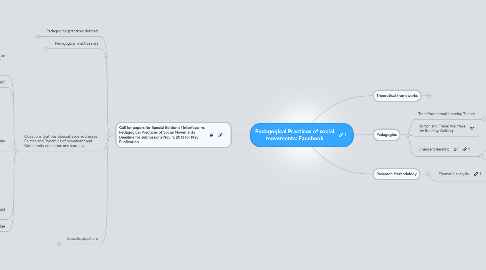
1. Call for papers for Special Edition of Interface re: Pedagogical Practices of Social Movements Deadline for submissions Nov. 1, 2013 for May Publication
1.1. Pedagogical practices defined.
1.1.1. Understood as knowledge practices and learning processes
1.1.2. Pivotal role in the emergence, development and sustainability of social movements and community struggles
1.1.3. Curious about how movements learn beyond the cognitive to ethical, spiritual, embodied and effective.
1.1.4. Aim to systematize and document these practices and provide conceptual, methodological and practical resources for activists, community educators, and movement scholars alike.
1.2. Pedagogical practices are
1.2.1. Can constitute important elements in the process of unlearning dominant subjectivities, social relationships and ways of constituting the world and learning new ones
1.2.2. Central in the how of movement construction and community building in space like workshops, teach-ins and popular education
1.2.3. Contribute to the building of sustainable and effective social movements through music, storytelling,
1.2.4. Ritual or processes that surround strategy building, the sharing of experiences or simply friendship
1.2.5. Help activists and organizers to learn through their participation in counter-hegemonic, grassroots initiatives, such as community banks, local currencies, and workers cooperatives
1.2.5.1. Social networking communities
1.3. Questions that this Special issue addresses: Politics and Dynamics of movement and Community education and learning
1.3.1. What role do pedagogical practices have in the praxis of social movements and their struggle for political change and social transformation?
1.3.2. What formal methodologies are used?
1.3.2.1. Open Spaces for Dialogue and Enquiry
1.3.2.1.1. What makes you who you are?
1.3.2.1.2. How do you understand the world?
1.3.2.1.3. What is your place in the world?
1.3.2.1.4. How are you connected to the people you don't know
1.3.2.1.5. Why should you be concerned about what is going on in the world?
1.3.2.2. Participatory Action Research
1.3.3. What methodologies of popular and community education?
1.3.3.1. Feminist
1.3.3.2. Freirean
1.3.3.3. Post-colonial
1.3.3.4. Gramscian
1.3.3.5. Informal approaches
1.3.3.5.1. under-conceptualized approaches
1.3.4. How is movement and community education contested terrain?
1.3.4.1. How do these practices end up reproducing inequalities of:
1.3.4.1.1. Class
1.3.4.1.2. gender
1.3.4.1.3. race/ethnicy
1.3.4.1.4. educational level
1.3.4.1.5. expertise
1.3.4.1.6. movement role hierarchies
1.3.5. Want to know about insider knowledge
1.3.5.1. Power dynamics behind knowledge production
1.3.5.2. relations between experts and non-experts
1.3.5.3. impact of gender, class, race, educational level and expertise.
1.3.5.4. How power dynamics determine whose voice gets heard
1.3.5.4.1. Whose voice gets silenced?
1.4. Specific questions
1.4.1. What learning processes and knowledge practices are developed by movements?
1.4.2. What is the role of formal methodologies and pedagogies in movement praxis?
1.4.3. What is the role of informal pedagogies of everyday practice in the building of movements, the development of their political projects and fostering their sustainability and effectiveness?
1.4.4. What is the role of the affective, embodied and spiritual in learning processes?
1.4.5. What is the role of ethics in movement learning?
1.4.6. What is the role of counter-hegemonic economic practices, such as those classified as “Solidarity Economy”, in learning processes within social movements?
1.4.7. In what way do activist researchers contribute to the learning of movements?
1.4.8. What politics of knowledge underlie the politics of social movements?
1.4.9. Do the processes of ‘alternative’ education within social movements and collective struggles transform, disrupt or replicate hegemonic social relations?
1.4.10. What pedagogical and political insights can be gleaned from exploring education for mobilization and social change?
2. Theoretical frameworks
2.1. Clay Shirky- Here Comes Everybody
2.2. Chaos and Complexity theory
2.3. Post-industrial urban policing policies
2.3.1. Order Maintenance policing
2.3.1.1. Policing styles
2.3.1.1.1. watchman style
2.3.1.1.2. service style
2.3.1.1.3. legalistic style
2.3.1.1.4. Based on racial threat theory
2.3.1.2. Problems of order maintenance policing
2.3.1.2.1. False dichotomy of law abiders and disorderly people
2.3.1.2.2. Only gives an illusion of order
2.3.2. Post-industrial cities
2.3.2.1. creative class
2.3.2.2. cultural tourism
2.3.2.3. racial threat
2.3.3. As YouTube is my witness!
2.4. Therapeutic
2.4.1. Reconciliation
2.4.1.1. Trauma and Recovery
2.4.1.2. The Orator
2.4.1.2.1. Samoan cultural practice - if you offend someone, your whole family must sit in front of their house until they come out an forgive you.
2.4.1.3. Police experience trauma too
2.4.2. Psychological
2.4.2.1. Online therapy as effective as face to face (maybe more)
3. Pedagogies
3.1. Transformational Learning Theory
3.1.1. Merizow
3.2. Horton and Freire: We Make the Road by Walking
3.3. Emergent learning
3.3.1. Networked Participatory Scholarship
3.3.1.1. What is scholarship
3.3.1.1.1. Includes not just scientific discovery but also teaching/
3.3.1.1.2. Scholarly primitives
3.3.1.1.3. Types of scholarship
3.3.1.2. Technology in scholarship
3.3.1.2.1. bibliographic management
3.3.1.2.2. data analysis tools
3.3.1.2.3. transcription services
3.3.1.2.4. Online journals
3.3.1.2.5. self-archive publications
3.3.1.2.6. Social networking
3.3.1.2.7. distribute free course materials
3.3.1.2.8. collect artifacts from distributed online contributors
3.3.2. MOOC
4. Research Methodology
4.1. Thematic analysis
4.1.1. I was assaulted by the Vancouver police
4.1.1.1. Bracketing applied to participant observer.
